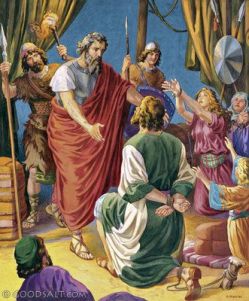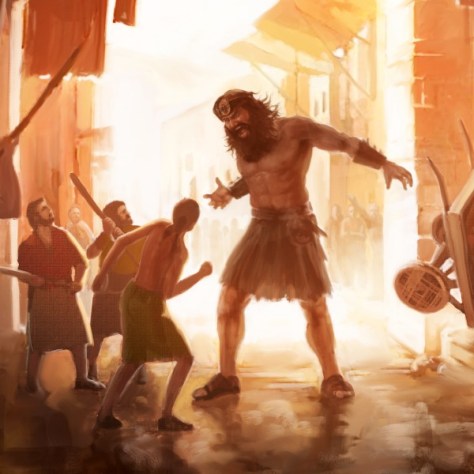Descendants of the Nephilim in Genesis 14

Genesis is best known for Abram’s encounter with the mysterious priest-king Melchizedek. It is also an unusual chapter because, “The style and subject matter of this story set it apart from the rest of the patriarchal material. Only here in Genesis do we have the account of a military campaign with various kings named” (Wenham, G. J. Genesis 1–15, WBC (Vol. 1, p. 304). The mention of place names (updated by the author of Genesis–e.g., “the king of Bela [that is, Zoar], v. 3) and people groups (e.g., the Zuzim and the Emim, v. 5) give the account an ancient and strange flavor. The average reader may tend to gloss over these difficult and enigmatic names and places quickly to get to the main point of the story–Abram’s rescue of Lot. However, overlooking some of these strange names, including the people groups mentioned above, will cause the reader to miss an important theme that begins in Genesis 6 and continues through 2 Samuel. This theme concerns the descendants of the Nephilim.
Who Are the Descendants of the Nephilim in Genesis 14?

All Bible commentators recognize that the Rephaim, Zuzim, and Emim mentioned in Genesis 14:5 are descendants of the Nephilim. This is because Deuteronomy 2:10-11 links the Emim with the Anakim and the Rephaim. The Anakim are specifically said to be descendants of the Nephilim (Num. 13:33). Based on ancient sources (the Genesis Apocryphon and Symmachus, according to Wenham, p. 311) the Zuzim are equated with the Zamzummim of Deuteronomy 2:20 (who are connected to the Rephaim in this verse).
It is also possible that the Horites mentioned in Genesis 14:6, and the Amorites mentioned in Genesis 14:7 are descendants of the Nephilim, or at least include descendants of the Nephilim. In the context of Deuteronomy 2:10-22, the Horites are also associated with these other people groups, as they are in Genesis 14:5-6. This may be due to being in the same geographical vicinity, however, Deuteronomy 2:20-22 mentions them in the same breath as the Zazummim and the Anakim. At least one OT passage, Amos 2:9-10, speaks of the tallness of the Amorites, and therefore may be associating them with the descendants of the Nephilim (see, Michael Heiser, The Unseen Realm, p. 197 for further discussion). Therefore, when the four kings from Mesopotamia, first subjugate this area (Gen. 14:1-4), and then conquer it again when resistance occurs (Gen. 14:5-12), they not only defeat the kings of Sodom and Gomorrah, they also defeat and destroy some of the descendants of the Nephilim.
What Point is Genesis 14 Making?
As noted above, this story occurs in the context of the Abram story. God has promised to bless Abram, make his name great, curse those who curse him, and use him to bless all peoples (Gen. 12:1-3). Genesis 14 demonstrates how God proves himself faithful to Abram. Abram’s defeat of these powerful kings, demonstrates that God is indeed making his name great. Furthermore, because of Lot’s connection to Abram, the kidnapping of Lot is equivalent to cursing those who belong to Abram. Thus, the Lord strikes a blow against these kings and uses Abram as a blessing to others by restoring the people and possessions to their land. The defeat of these kings, who subjugated and defeated the fierce descendants of the Nephilim, serves to enhance Abram’s reputation even more. Hamilton states, “The invading kings repress such attempted revolts in grandiose and unmitigated style. Nobody can stand before them, even though the defeated Rephaim, Zuzim, and Emim are themselves imposing threats, people of giant stature (Deut. 2:10–12, 20–23). This makes Abram’s ability to rout these potentates all the more impressive” (Hamilton, V. P., The Book of Genesis, Chapters 1–17, NICOT, p. 402).
Destroying the Descendants of the Nephilim

A look at the map above shows that the descendants of the Nephilim surrounded on the east, the land promised to Abram and his descendants. Furthermore, the Bible makes clear that the descendants of the Nephilim also occupied the land of promise (e.g., Num. 13:33; Josh. 11:21-22). As Heiser points out in regards to the Conquest, “This wouldn’t be just a battle for land. It was a battle between Yahweh and the other gods—gods who had raised up competing human bloodlines that were opposed to Yahweh’s plan and people” (Heiser, M. The Unseen Realm, p. 197. Also see my article here).

Although it’s understandable that these kings would have wanted to control this land for trade reasons, since the ancient highway known as the King’s Highway goes through this area, God may have had other purposes. Knowing God’s desire to destroy the offspring of the Nephilim, could it be that God sent these kings against this territory in order to begin their destruction? According to Deuteronomy 2:10-22, God destroyed the descendants of the Nephilim in this area by giving the land to the Ammonites, the Moabites, and the Edomites. He also used Moses and Israel to destroy Sihon and Og Amorite kings (Og is described as the remnant of the Rephaim–Deut. 3:1-13). He would also destroy the remnant of the Nephilim when Israel conquered the land of promise. Just as God would later use nations from Mesopotamia (Assyria and Babylon) to punish his own people (e.g., Isaiah 10:5), so he may have used the four Mesopotamian kings in Genesis 14 to destroy the inhabitants of Abram’s day. When the kings, however, jeopardized the family of Abram in their conquest, God punished these kings. Similarly, although God used Assyria and Babylon to afflict his people Israel, he later judged these nations for their brutality (e.g., Isaiah 30:31; Nahum).
Significance
The fact that Genesis 14 contains an account of the destruction of some of the descendants of the Nephilim is worthy of recognition, because of its immediate impact on the story of Abram, and also for the future implications of Israel receiving the land promised to Abram.